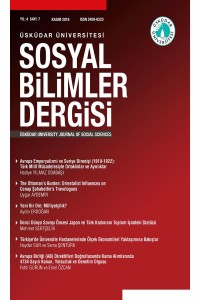Abstract
Bu makale, Cenap Şahabettin’in eserlerindeki “Doğu” tasviri ve “Doğulu” temsilleriyle ilgilidir. Cenap yalnızca bir entelektüel değil aynı zamanda Devlet bürokrasisinin bir temsilcisiydi. İstanbul ve Paris’te gerçekleştirdiği tıp eğitimiyle cilt doktoru olan Cenap, önce Mısır’a sonra Irak’a görevli olarak atandı. Cenap’ın Arap toprakları üzerine olan eserlerinin basılması, Osmanlıların asırlardır süren
hükümet etme anlayışlarının yerini o bölgede modernist hükmetme yöntemlerine terk ettiği zamana denk geldi. Osmanlılar kendilerini bir Avrupa devleti olarak görürken Avrupalıların onlara yönelttiği iktidar içeren oryantalist bakışı onlar da kendi doğularına yönelttiler. Avrupalı seyyahların eserlerinde sıklıkla görülen Avrupalıların çalışkan, güçlü, anayasal olmalarına karşın “Doğuluların” tembel, zayıf, despotik oldukları yönündeki bakışı içselleştirerek bunun içsel bir paradoksa dönüşmesi tehlikesine karşın ikinci grup sıfatı kendi taşralarına yönelttiler. “Doğuluların” mantıklarını özgürce kullanmadıkları için despotik hâkimleri hak ettikleri ve Doğu despotizmi tartışması Osmanlı’nın bölgedeki hâkimiyetini meşrulaştırmak için kullanılmıştır. Bunların yanı sıra bölgenin iktisadi geri kalmışlığı, Cenap’ın gözlemlediği yer ve insanların modernize edilmesi gerektiği sonucuna varmasını sağlamıştır. Bu modernizasyon projesi için bölgenin yerel insan kaynaklarının yeterli olmadığı, batılıların da bu iş için iyi bir aday olmadıklarını savunan Cenap, Osmanlıların bölgede gerçekleştirdiği gelişmeleri sayarak Osmanlıların bölgeyi modernize etmek için uygun ve iyi bir aday olduğunu vurgulamıştır. Edward Said, Ussama Makdisi, Jale Parla gibi yazarların eserlerini kullanan bu makale, Cenap’ın eserlerine semiyotik bir yaklaşımda bulunarak Cenap’ın tavrını batılı seyyahlarla kıyaslayarak genel bir resim çizmeye çalışmaktadır.
References
- Anouar Abdel Malek, “L’Orientalisme en crise”, Diogène, 1963, 44 (4), 109-142.
- Bâki Asiltürk, “Cenap Şahabettin’in Suriye Mektupları” [“Cenap Şahabettin’s Letters from Syria”], U’npublished MA thesis, (İstanbul: Marmara Üniversitesi Türkiyat Araştırmaları Enstitüsü 1991).
- Cenap Şahabettin, Âfâk-ı Irak: Kızıldeniz’den Bağdat’a Hatıralar [The Horizons of Iraq: Memories from the Red Sea to Baghdad], Ed.Bülent Yorulmaz, (İstanbul: Dergah 2002).
Abstract
References
- Anouar Abdel Malek, “L’Orientalisme en crise”, Diogène, 1963, 44 (4), 109-142.
- Bâki Asiltürk, “Cenap Şahabettin’in Suriye Mektupları” [“Cenap Şahabettin’s Letters from Syria”], U’npublished MA thesis, (İstanbul: Marmara Üniversitesi Türkiyat Araştırmaları Enstitüsü 1991).
- Cenap Şahabettin, Âfâk-ı Irak: Kızıldeniz’den Bağdat’a Hatıralar [The Horizons of Iraq: Memories from the Red Sea to Baghdad], Ed.Bülent Yorulmaz, (İstanbul: Dergah 2002).
Details
| Primary Language | English |
|---|---|
| Journal Section | Articles |
| Authors | |
| Publication Date | November 29, 2018 |
| Submission Date | September 25, 2018 |
| Published in Issue | Year 2018 Issue: 7 |
Cite
The opinions in the articles published in Üsküdar University Journal of Social Sciences belong to the author. The articles published in another journal, book, and so on are not accepted. National or international conference presentations, seminar presentations, or panel presentations can be included in the publication process after being specified in the footnote and converted into the article format.
Academic articles published in the journal can only be reproduced for educational purposes. The articles and the graphics and tables in the articles cannot be duplicated or archived in part or as a whole without permission except for educational purposes. Quotations may be made from the articles under the condition that they are indicated in the academic publications.
It is assumed that the authors undertake that they would not claim royalties for the articles they submit to Üsküdar University Journal of Social Sciences.

